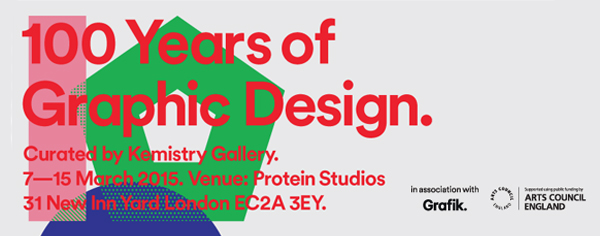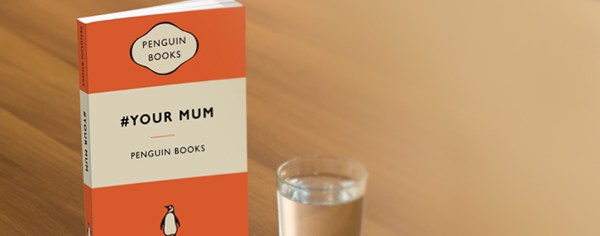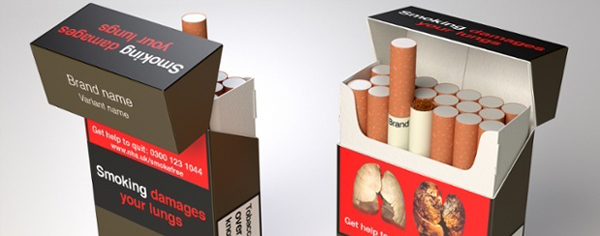As a graphic design studio in Newcastle we always take note of what’s happening in the wider design world. Lots can happen in just one short week so here’s a quick roundup of some of the bigger stories we’ve followed from the past seven days.
Use our quick links to read about:
100 Years of Graphic Design / Penguin’s Mama / Tobacco Branding
Kemistry Gallery was set up in Shoreditch in London by Graham McCallum and Ricky Churchill. After refurbishing the ground floor of their brand agency building, they made it into a gallery space in order to promote past masters and upcoming talent of the graphic design world. Despite its popularity, after 10 years of shows and exhibitions the gallery had to close its doors at the end of last year due to crippling rent increases in the area.
Now Kemistry is staging a come back with a Kickstarter and Arts Council-funded pop-up exhibition; a retrospective of ‘100 Years of Graphic Design’. Including a map of the London Underground from 1914, nuclear disarmament posters from the 1960s and the contemporary alphabet designs of Ben Eine, the exhibition is an eclectic mix of McCallum and Churchill’s favourite pieces. The show is a launchpad for the duo’s ambitious plans to open a new permanent gallery space. Feeling that graphic design is not promoted or exposed as much as other design disciplines, they are hoping that the new gallery will become a National Centre for Graphic Design featuring standing and temporary exhibits as well as lecture spaces and a cafe and shop.
‘100 Years of Graphic Design’ is hosted at Protein Studios and runs until this Sunday (15th March).

Social media can be a cruel mistress. It would be easy to add a special ‘Social Media Blunder of the Week’ segment to our Friday Roundup and we’re sure that we’d be able to fill it every time. Like Coke before them, Penguin Books were just looking to spread a little cheer on the run-up to Mother’s Day this Sunday. Unfortunately, their buy-a-book for Mother’s Day campaign was spearheaded with the hashtag #YourMum. The response was a raft of ‘Yo Mama’ jokes such as: #Yourmum is so fat the photo I took of her last Christmas is still printing (obviously, most of the 7,000 joke tweets were not that mild!). Such an obvious launchpad for crass micky-taking really should have been foreseen – which has caused some to question whether this was really a marketing blunder or actually an attempt to court publicity, however negative. There are some companies that would take the ‘bad publicity is still publicity’ route but Penguin Books doesn’t seem the type. And it’s even more unlikely given that the top trending topic at the same time was International Women’s Day.
The horseplay at Penguin’s expense doesn’t appear to have done too much damage; during the week Penguin continued to trend in the UK with people talking about books rather than crass jokes. But it is yet another example of backfiring social media promotion that adds to the debate on how brands can best avoid such mistakes. It might be worth every company who is looking to engage through social media to employ a teenage boy to vet all outgoing online communications – this may be the most effective way of catching the double entendres and easily highjack-able hashtags before they’re let loose.

England is to become the third country, after Australia and Ireland, to adopt plain packaged cigarettes after a Commons vote on Wednesday. The new legislation, slated to come into effect in May 2016, will see all cigarette packs adopt the same size and plain colour design with a generic typeface. They will also feature the now standard health warnings and shock imagery that have been in place since 2008. Whilst there have been no definitive study results released on the impact that the change has had in Australia, the move has been openly welcomed by health campaigners and cancer charities. Editor-in-chief of the journal Addiction, Robert West, said “Even if standardised packaging had no effect at all on current smokers and only stopped one in 20 young people from being lured into smoking, it would save about 2,000 lives a year.”
Unsurprisingly, the tobacco companies are not so taken with the move. Should the legislation be passed into law by the House of Lords, many cigarette makers are threatening legal action against the government for infringement of their intellectual property rights. Alex Gietz of Imperial Tobacco said: “No-one starts or continues to smoke because of the colour of the pack. We have a fundamental right to differentiate our brands from those of our competitors.”
How might this affect the manner in which the tobacco companies approach their marketing? There may be an increase in the choice and popularity of branded cigarette cases or plastic wraps to cover the plain packaging. Some have suggested that the cigarettes themselves may be ‘brand able’ if only with small indentifers to differentiate the make. Irrespective of the ethical complexities of the new legalisation, it raises an important question relating to company branding. How can you leverage customer loyalty, and indeed increase consumer use of your product, in the absence of the most basic foundations of successful branding – logo, packaging, and advertising?